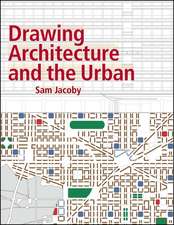Planning Europe's Capital Cities: Aspects of Nineteenth-Century Urban Development: Planning, History and Environment Series
Autor Thomas Hallen Limba Engleză Paperback – 15 oct 2009
Thomas Hall examines the planning process in fifteen of those cities and addresses the following questions: when and why did planning begin, and what problems was it meant to solve? Who developed the projects, and how, and who made the decisions? What urban ideas are expressed in the projects? What were the legal consequences of the plans, and how did they actually affect subsequent urban development in the individual cities? What similarities or differences can be identified between the various schemes? How have such schemes affected the development of urban planning in general?
| Toate formatele și edițiile | Preț | Express |
|---|---|---|
| Paperback (1) | 410.77 lei 6-8 săpt. | |
| Taylor & Francis – 15 oct 2009 | 410.77 lei 6-8 săpt. | |
| Hardback (1) | 1300.83 lei 6-8 săpt. | |
| Taylor & Francis – 12 iun 1997 | 1300.83 lei 6-8 săpt. |
Din seria Planning, History and Environment Series
-
 Preț: 306.97 lei
Preț: 306.97 lei -
 Preț: 311.61 lei
Preț: 311.61 lei -
 Preț: 351.55 lei
Preț: 351.55 lei -
 Preț: 332.68 lei
Preț: 332.68 lei -
 Preț: 394.62 lei
Preț: 394.62 lei - 9%
 Preț: 1245.81 lei
Preț: 1245.81 lei - 8%
 Preț: 386.09 lei
Preț: 386.09 lei - 23%
 Preț: 373.92 lei
Preț: 373.92 lei - 26%
 Preț: 766.31 lei
Preț: 766.31 lei - 12%
 Preț: 345.17 lei
Preț: 345.17 lei - 23%
 Preț: 327.26 lei
Preț: 327.26 lei -
 Preț: 424.58 lei
Preț: 424.58 lei - 16%
 Preț: 244.47 lei
Preț: 244.47 lei - 15%
 Preț: 463.82 lei
Preț: 463.82 lei - 18%
 Preț: 949.75 lei
Preț: 949.75 lei - 26%
 Preț: 1017.20 lei
Preț: 1017.20 lei -
 Preț: 416.96 lei
Preț: 416.96 lei - 12%
 Preț: 299.87 lei
Preț: 299.87 lei -
 Preț: 366.46 lei
Preț: 366.46 lei - 18%
 Preț: 1274.88 lei
Preț: 1274.88 lei -
 Preț: 471.33 lei
Preț: 471.33 lei - 12%
 Preț: 302.80 lei
Preț: 302.80 lei -
 Preț: 396.33 lei
Preț: 396.33 lei - 18%
 Preț: 1274.11 lei
Preț: 1274.11 lei -
 Preț: 422.04 lei
Preț: 422.04 lei - 17%
 Preț: 245.56 lei
Preț: 245.56 lei - 26%
 Preț: 1018.82 lei
Preț: 1018.82 lei - 15%
 Preț: 461.87 lei
Preț: 461.87 lei - 28%
 Preț: 824.70 lei
Preț: 824.70 lei - 18%
 Preț: 1007.12 lei
Preț: 1007.12 lei -
 Preț: 373.21 lei
Preț: 373.21 lei - 25%
 Preț: 768.30 lei
Preț: 768.30 lei - 26%
 Preț: 990.63 lei
Preț: 990.63 lei - 31%
 Preț: 767.47 lei
Preț: 767.47 lei - 28%
 Preț: 991.70 lei
Preț: 991.70 lei
Preț: 410.77 lei
Nou
Puncte Express: 616
Preț estimativ în valută:
78.60€ • 82.06$ • 65.05£
78.60€ • 82.06$ • 65.05£
Carte tipărită la comandă
Livrare economică 04-18 aprilie
Preluare comenzi: 021 569.72.76
Specificații
ISBN-13: 9780415552493
ISBN-10: 0415552494
Pagini: 408
Ilustrații: black & white illustrations, maps, figures
Dimensiuni: 210 x 280 x 23 mm
Greutate: 0.79 kg
Ediția:1
Editura: Taylor & Francis
Colecția Routledge
Seria Planning, History and Environment Series
Locul publicării:Oxford, United Kingdom
ISBN-10: 0415552494
Pagini: 408
Ilustrații: black & white illustrations, maps, figures
Dimensiuni: 210 x 280 x 23 mm
Greutate: 0.79 kg
Ediția:1
Editura: Taylor & Francis
Colecția Routledge
Seria Planning, History and Environment Series
Locul publicării:Oxford, United Kingdom
Public țintă
PostgraduateCuprins
Preface 1. Introduction 2. From Hippodamus to Haussmann: Town Planning in a Historical Perspective Part 1: The Cities 3. Paris 4. London 5. Helsinki 6. Athens 7. Christiania 8. Barcelona 9. Madrid 10. Copenhagen 11. Vienna 12. Berlin 13. Stockholm 14. Brussels 15. Amsterdam 16. Budapest 17. Rome Part 2: Capital City Planning 18. The Background and Motivation for the Plans 19. The Authors of the Plans 20. The Decision Process 21. Content and Purpose of the Plans 22. Elements of the Plans 23. Attitudes to Cityscape 24. Implementation and Results 25. The Role of the Capital City Projects in Planning History
Recenzii
'...a labour of love and a major contribution to the burgeoning international literature...it will fill an evident gap in the available scholarship.' - Peter Hall, University College, London
" ...a work of comparative history at its best. There are no false comparisons or wide-ranging generalisations. Instead there is a meticulous review... magnificiently produced, the quality of illustrations is outstandingly good and the author has been given space for text and notes which makes it extremely easy to use. Nothing but praise and thanks to the author for a work which will give so much pleasure and instruction."
'Planning Europe's Capital Cities will also, as mentioned by Peter Hall in the forword, 'throw light on great planners whose reputations have too long laid in their own lands and languages'. It will also inform visitors as to how many features, which now seem quintessential characteristics of the cultural heritage of many European cities, were created at the time.' - Claude Chaline, Town Planning Review
Hall's book is a useful resource for understanding the challenges faced by urban planners of large cities in the nineteenth century, and it is valuable as a starting point for scholars wishing to pursue further study of urban planning in nineteenth century Europe. - Erik C. Maiershofer, H-Urban
" ...a work of comparative history at its best. There are no false comparisons or wide-ranging generalisations. Instead there is a meticulous review... magnificiently produced, the quality of illustrations is outstandingly good and the author has been given space for text and notes which makes it extremely easy to use. Nothing but praise and thanks to the author for a work which will give so much pleasure and instruction."
'Planning Europe's Capital Cities will also, as mentioned by Peter Hall in the forword, 'throw light on great planners whose reputations have too long laid in their own lands and languages'. It will also inform visitors as to how many features, which now seem quintessential characteristics of the cultural heritage of many European cities, were created at the time.' - Claude Chaline, Town Planning Review
Hall's book is a useful resource for understanding the challenges faced by urban planners of large cities in the nineteenth century, and it is valuable as a starting point for scholars wishing to pursue further study of urban planning in nineteenth century Europe. - Erik C. Maiershofer, H-Urban
Descriere
A wide-ranging study of planning in fifteen major European cities, this book includes case studies of development schemes for each city, and general discussion of capital together with city planning. Well illustrated throughout with plans and drawings, it offers useful comparisons between the familiar and less familiar case studies selected. An impressive source book for both historians and practitioners in the fields of planning and architecture.


















